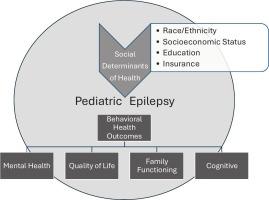Health disparities in youth with Epilepsy: A closer look at behavioral health outcomes
IF 2.3
3区 医学
Q2 BEHAVIORAL SCIENCES
引用次数: 0
Abstract
A recent scoping review of health disparities and equities in pediatric epilepsy identified behavioral health outcomes as the largest represented domain, comprising 23% of findings. The current study sought to elucidate these findings by examining social determinants of health (SDOH), including: race/ethnicity, insurance, socio-economic status (SES), and education, within the context of four behavioral health domains: mental health, neurocognitive, family functioning, and health-related quality of life (HRQOL). Results from the scoping review revealed a total of 76 unique behavioral health findings, with more health disparities than equities in the neurocognitive and HRQOL domains and more health equities than disparities in the mental health and family functioning domains. The highest number of disparities was related to socio-economic status (SES; 74.1%). However, due to the complexity and intersectionality of SDOH in behavioral health functioning, combined with differences in methodologies between studies, we caution against general conclusions regarding the role of SDOH in barriers to pediatric epilepsy care. Instead, specific SDOH should be considered within each behavioral health domain.

青少年癫痫患者的健康差异:对行为健康结果的进一步观察
最近对儿童癫痫的健康差异和公平性进行的范围审查确定,行为健康结果是最大的代表性领域,占调查结果的23%。目前的研究试图通过检查健康的社会决定因素(SDOH)来阐明这些发现,包括:种族/民族、保险、社会经济地位(SES)和教育,在四个行为健康领域的背景下:心理健康、神经认知、家庭功能和健康相关的生活质量(HRQOL)。范围审查的结果共揭示了76项独特的行为健康发现,在神经认知和HRQOL领域的健康差异大于公平,在心理健康和家庭功能领域的健康公平大于差异。与社会经济地位相关的差异最大(SES; 74.1%)。然而,由于SDOH在行为健康功能中的复杂性和交叉性,加上研究方法的差异,我们对SDOH在儿童癫痫护理障碍中的作用的一般结论持谨慎态度。相反,应该在每个行为健康领域内考虑特定的SDOH。
本文章由计算机程序翻译,如有差异,请以英文原文为准。
求助全文
约1分钟内获得全文
求助全文
来源期刊

Epilepsy & Behavior
医学-行为科学
CiteScore
5.40
自引率
15.40%
发文量
385
审稿时长
43 days
期刊介绍:
Epilepsy & Behavior is the fastest-growing international journal uniquely devoted to the rapid dissemination of the most current information available on the behavioral aspects of seizures and epilepsy.
Epilepsy & Behavior presents original peer-reviewed articles based on laboratory and clinical research. Topics are drawn from a variety of fields, including clinical neurology, neurosurgery, neuropsychiatry, neuropsychology, neurophysiology, neuropharmacology, and neuroimaging.
From September 2012 Epilepsy & Behavior stopped accepting Case Reports for publication in the journal. From this date authors who submit to Epilepsy & Behavior will be offered a transfer or asked to resubmit their Case Reports to its new sister journal, Epilepsy & Behavior Case Reports.
 求助内容:
求助内容: 应助结果提醒方式:
应助结果提醒方式:


